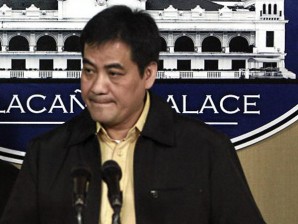Palace: NDF ‘killed’ talks
Prospects are dimming, if not altogether lost, for a peaceful end under the Aquino administration to the longest-running and lone Maoist insurgency in Asia.
Presidential spokesperson Edwin Lacierda said on Wednesday that even the so-called “special track” proposed by the Communist Party of the Philippines-New People’s Army-National Democratic Front (CPP-NPA-NDF) to salvage its peace talks with the government did not even progress.
Lacierda used the word “killed,” hinting that this could be the end of the road for peace talks with the communist movement led by exiled CPP founder Jose Maria Sison.
The special track was widely expected to jumpstart the stalled talks since it would require the communist leadership to give up preconditions for talks to resume. However, the NDF later backtracked and demanded in February the release of detained communist rebels before the negotiations could resume.
In a phone-patch interview with reporters, Lacierda quoted a statement from peace process adviser Teresita Deles on the lack of progress in the talks following consultations in Manila with Norwegian special envoy Ture Lundh who is brokering the negotiations.
Article continues after this advertisement“In our discussion with our Norwegian facilitator last month, when he was here, we mutually established that the NDF killed the special track that they had themselves proposed,” said Deles in her statement. Deles said the Aquino administration had closed the door on negotiations under the “regular track.”
Article continues after this advertisement“We are not going back to the regular track which is going nowhere,” said Deles.
“We are always ready to resume talks under a new approach which will offer a better chance of bringing us to the peace our people desire and deserve. We are currently undertaking discussions towards this new approach,” said Deles, but did not elaborate.
NDF informed
The new approach may refer to pursuing localized peace talks with the rebels.
Lacierda denied claims by Luis Jalandoni, head of the communist peace panel, that the NDF had not been informed of the government’s decision to formally stop the negotiations.
“That’s not true,” said Lacierda, explaining that the communist rebels based in The Netherlands “knew that nothing came out of the regular track … because they have so many preconditions.”
Lacierda said that the NDF had been demanding the release of detained rebels, but the problem was the diskette containing the Joint Agreement on Safety and Immunity Guarantees (Jasig) list had been “corrupted.”
“That’s the problem with the regular track. In the special track, they all know what happened to it. So what we can say is that it’s not true that Mr. Jalandoni has not been notified—they know. They have been informed. It’s impossible for them not to know about it because they discussed this (with the government panel),” he said.
The government is not giving in to the NDF demand for the release of its captured commanders, Lacierda said.
Intensified operations
Gen. Emmanuel Bautista, chief of staff of the Armed Forces of the Philippines, has ordered intensified operations against NPA guerrillas extorting money from politicians campaigning in rebel-controlled areas, Lacierda said.
“We will not cease our efforts to curb these activities. It happened in Bulacan, (where) we apprehended (rebels). We will intensify these efforts particularly in the last two weeks (before the elections),” said Lacierda.
Asked if the government’s decision to halt the talks would be announced soon, he said:
“We are just awaiting the statement that will come from Secretary Deles because she is talking of a new approach. Whatever is that new approach, let’s just wait for its announcement. Again, we are committed to resolving all internal conflicts, armed conflicts, peacefully.”
Told that government chief negotiator Alex Padilla had given up hope that the communist problem would be solved within the Aquino presidency, Lacierda said: “When we speak of formal talks, you’re referring to the regular track. If they keep on insisting on preconditions like the release of those under the Jasig list… there is no way forward there.”
